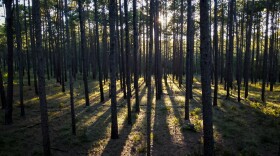Celeste Gracia
Celeste Gracia was born and raised in deep south Texas. She’s always loved to read and write, so when she discovered journalism in high school, she knew it was for her. She graduated from the University of North Texas. She previously interned at CBS News Radio in New York and Morning Edition in Washington D.C. She constantly craves cookies & creme ice cream and enjoys singing along to Broadway musicals.
-
It's unclear exactly how long the 'foreseeable future' is. These projects are expected to become more expensive over time. Regardless, residents say they will support these replenishment efforts.
-
Inmates at the Alexander Correctional Facility, located about an hour west of Winston-Salem, allege they are being mistreated. Some have been on a hunger strike to protest these conditions.
-
Researchers started collecting data on 12 species of sharks in 1972 in Onslow Bay. A recently published study analyzing this data found all 12 species appeared physically smaller over the years.
-
The state also recently opened more mass testing sites, including one at WakeMed Soccer Park in Cary. Health care leaders across the state are pleading with the public to get vaccinated and boosted against COVID-19.
-
North Carolina environmental officials recently added dozens of new goals and recommendations to the state's Coastal Habitat Protection Plan.
-
In this two-part series "The Wood Energy Dilemma," reporters from WFAE and WUNC visit communities feeding the world’s appetite for wood energy.
-
After years of delay, the EPA is moving to regulate industrial chemicals linked to cancer and other health problems. Companies will have to disclose the amount found in many household items.
-
For decades, the tree was chopped down for timber. Now, growing research shows that longleaf pine is especially resilient to climate change.
-
A regular water quality review has environmental advocates pushing the North Carolina Department of Environmental Quality on standards for E. Coli, PFAS, and 1,4 Dioxane.
-
A recently published study from North Carolina State University finds that standing dead trees in coastal wetland forests increase greenhouse gas emissions in their ecosystem by about 25%.








